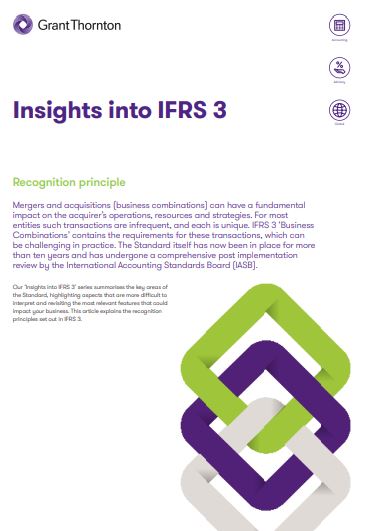-
Aviation Advisory
Our dedicated Aviation Advisory team bring best-in-class expertise across modelling, lease management, financial accounting and transaction execution as well as technical services completed by certified engineers.
-
Business Risk Services
Our Business Risk Services team leverage our risk, internal audit and technology subject matter expertise to critically assess your governance, risk and internal control mechanisms, thus helping you to better manage risk and enable more informed decision making.
-
Consulting
Whatever your business needs, our Consulting team can help you to move forward and identify and implement major transformations efficiently and effortlessly.
-
Financial Accounting and Advisory Services (FAAS)
As organisations expand into new markets or undertake functional financial transformations, the challenges faced by their accounting and finance teams become more complex. The Financial Accounting and Advisory Services (FAAS) team at Grant Thornton is a multi-disciplinary team that designs and implements creative solutions to address these complexities.
-
Fintech
Our Fintech team will be offering you an opportunity to sit with our experienced consultants to discuss your challenges.
-
Forensic Accounting
Organisations may undergo some type of dispute or internal investigation during their lifetime. Our Forensic Accounting team can seek evidence that can make the difference between finding the truth or being left in the dark.
-
Risk Advisory
Our Risk Advisory team delivers innovative solutions and strategic insights for the Financial Services sector, addressing disruptive forces, regulatory changes, and emerging trends to enhance risk management and foster competitive advantage.
-
Sustainability Desk
We recognise that businesses are operating at different levels of maturity when it comes to sustainability, and pride ourselves on working with our clients to develop bespoke solutions to their exact needs.
-
Company Tax
Our tax team is made up of highly experienced professionals who work with our clients to ensure they are compliant with all aspects of their corporation tax obligations by gaining a deep understanding of the businesses.
-
Global Mobility
Grant Thornton offer a different approach to managing global mobility. We have brought together specialists from our tax, global payroll, people and change and financial accounting teams
-
Indirect Tax Advisory & Compliance
Our Indirect Tax team helps businesses manage their IOM, UK and global indirect tax risks which, as transactional taxes, can quickly become large liabilities.
-
International Tax
We work closely with our colleagues globally to provide a seamless multi-jurisdiction service offering which ensures clients have an appropriate tax structure that mirrors what they are doing operationally – a key consideration in a world where it is no longer possible to separate a company’s tax and operational presences.
-
Private Client
Our team of experienced advisors can assist and navigate you through the tax issues arising when establishing a business, moving to the Island, leaving the island, passing on wealth alongside residence and domicile issues. We can help minimise the impact that taxes, such as income tax, capital gains tax and inheritance tax, may have upon your personal wealth.

For most entities such transactions are infrequent, and each is unique. IFRS 3 ‘Business Combinations’ contains the requirements for these transactions, which can be challenging in practice. The Standard itself has now been in place for more than ten years and has undergone a comprehensive post implementation review by the International Accounting Standards Board (IASB).
Our ‘Insights into IFRS 3’ series summarises the key areas of the Standard, highlighting aspects that are more difficult to interpret and revisiting the most relevant features that could impact your business. This article explains the recognition principles set out in IFRS 3.
Overview of IFRS 3’s recognition and measurement principles
The acquisition method requires the acquirer, to recognise and measure the acquiree’s identifiable assets acquired and liabilities assumed at their acquisition-date fair values, subject to some exceptions. These assets and liabilities usually include assets and liabilities already reported in the acquiree’s financial statements.
Applying the acquisition method may, however, also result in recognising assets and liabilities that were not previously reported in the acquiree’s financial statements for instance a brand name, a patent or a customer relationship, as the acquiree developed them internally.
IFRS 3’s recognition and measurement principles should be applied to determine which assets and liabilities to recognise and how they should be measured. The identifiable assets acquired and liabilities assumed should consist of those that:
- belong to the acquiree at the date of acquisition, and;
- form part of what has been acquired by the acquirer.
Most, but not quite all, of these assets and liabilities are measured at fair value at the acquisition date – the so called ‘fair value exercise’. (The term ‘purchase price allocation’ is still frequently used to describe this process although it does not perfectly align with the IFRS 3 accounting model). This fair value exercise is usually a complex and timeconsuming step in accounting for a business combination.
Practical insight
-
The objective of this exercise is to identify the main items for which the acquirer made the decision to purchase the business. Establishing the core reasons for making the purchase should help to identify the intangible assets acquired, that is, what did the acquirer get in return for the consideration paid and what they were willing to pay for? For example, was it to gain access to a specific technology, to acquire a trademark with a market share (this is usually associated with a technology, a know-how or a process)?
Many entities engage outside specialists in the valuation area to provide assistance. In most cases this step requires a good knowledge of the business acquired, careful analysis, extensive use of estimates and management judgement in a number of areas.
Refer to our article ‘Insights into IFRS 3 – How should the identifiable assets and liabilities be measured?’ for more details on the fair value exercise.
In an acknowledgement of these challenges, IFRS 3 allows a ‘measurement period’ of up to twelve months from the date of acquisition for the acquirer to complete the initial accounting for the business combination.









